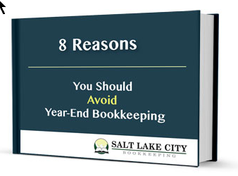It’s that time of year again. Can you sense it? Year-end is just around the corner. The rivers are getting cold, the smell of fall is in the air, snow is starting to show in the mountains and everyone is getting excited for winter (at least our office is).
For many business owners Thanksgiving through Christmas is a time to take a laid back approach to their business. Taking that approach leaves you behind in your business and that is no way to start a new business year. Here is a year-end checklist for the small business owner.
- Review your bookkeeping prior to year-end and clear up any outstanding issues.
- Make sure that your QuickBooks file is completely up to date and reconciled.
- Ensure that you are in compliance with subcontractors and 1099’s. Make sure you have all the proper documentation.
- Review your asset accounts to ensure nothing is booked to an asset account incorrectly.
- Schedule a tax consultation with their CPA prior to year-end.
- Bring a QuickBooks file that is updated through November so you can resolve any questions you have and get a handle on your taxes.
First, if there are any tax advantageous moves that you can make you will have time to do so. Additionally if you are going to end up owing a large amount in taxes you will have sufficient notice to make a plan to pay that balance.
Nothing is worse than finding out you owe a lot of money in taxes with just a few weeks’ notice.
I always recommend that you have a tax consultation in early December each year with your CPA.
- Develop a budget for your small business each year. I recommend building your budget towards the end of Q4 each year but definitely before the year closes out.
- Enter your budget into QuickBooks and use it as a way to guide your business. Don’t make the mistake of developing a budget and then tucking it in a file cabinet and never reviewing it again. You should be doing budget vs actual comparisons throughout the year to make sure you are staying on track.
- After you have attended to your financial year-end tasks you should take a good look at your organization as a whole.
- Take a step back from the details and look at your organizational chart from a far.
- What are your strengths and weaknesses?
- What will be your needs in the coming year from an organizational perspective?
- What gaps or opportunities do you see in your organization chart?
Taking a step back and looking at your organizational chart is a great way to define needs, as well as refine your long-term vision.
Prior to year-end is a great time to shop your major policies. I like to review my insurance policies with our agent to look for any gaps in coverage or possible ways to reduce our rates.
- Look at comparisons with other merchant processing companies.
- Shop and see if you can reduce your costs.
- Review your health plan and shop with other carriers.
- Review and modify your long-term budget and forecast before year-end.
- Develop a five-year budget & forecast. It’s a mistake to never modify it. If you don’t revisit your long-term budget and forecast each year then that five year forecast becomes a four, three or two year forecast.
- Always look at the long-term financial plan for your business.
- Simple, have an exit plan.
If you said “what exit plan?” then we already have a problem. Having an exit plan in place for your business is incredibly important. Without a plan for exiting your business how do you think it will ever happen? Additionally how will you know when the time is right?
Many small businesses don’t develop an exit plan because they don’t see the point of it. Having an exit plan in place is important and you should review and modify it annually as needed.
Are You Ready for Year End Bookkeeping?
As the year winds down it may seem like a time to celebrate and relax. While it is important to relax there are a lot of tasks you need to do as a business owner prior to year-end if you want to succeed in your small business. That way you hit each new business year running on track towards your goals.
In general, you should avoid year end bookkeeping and instead prepare for the year ahead. Don’t wait until the end of the year to get your finances in order! Work with your internal bookkeeper or outsource your bookkeeping to ensure all your financial needs are taken care of before tax day!
What other critical tasks do you handle before year-end each year?

Leave a Reply